A Study on Psychological Interventions and Dementia Health Status
VerifiedAdded on 2019/12/03
|36
|10997
|246
Essay
AI Summary
This double dissertation investigates the effectiveness of psychological interventions in improving the health status of people with dementia. The research begins with an introduction outlining the problem statement and research objectives, followed by a literature review that explores various intervention approaches, including psychodynamic, memory and lifestyle evaluation, support groups, reality orientation, memory training, and behavioral approaches. The methodology involves a review of secondary sources from databases like Cinahl, Psychnet, and Medline, focusing on UK-based research and incorporating both quantitative and qualitative studies. The study aims to determine the effectiveness of these interventions and provide recommendations for treatment, considering the social and environmental factors that influence the symptoms and behaviors of dementia patients. The significance of the research lies in its potential to equip healthcare professionals with the knowledge to provide timely diagnosis and management, ultimately improving the quality of life for individuals with dementia.
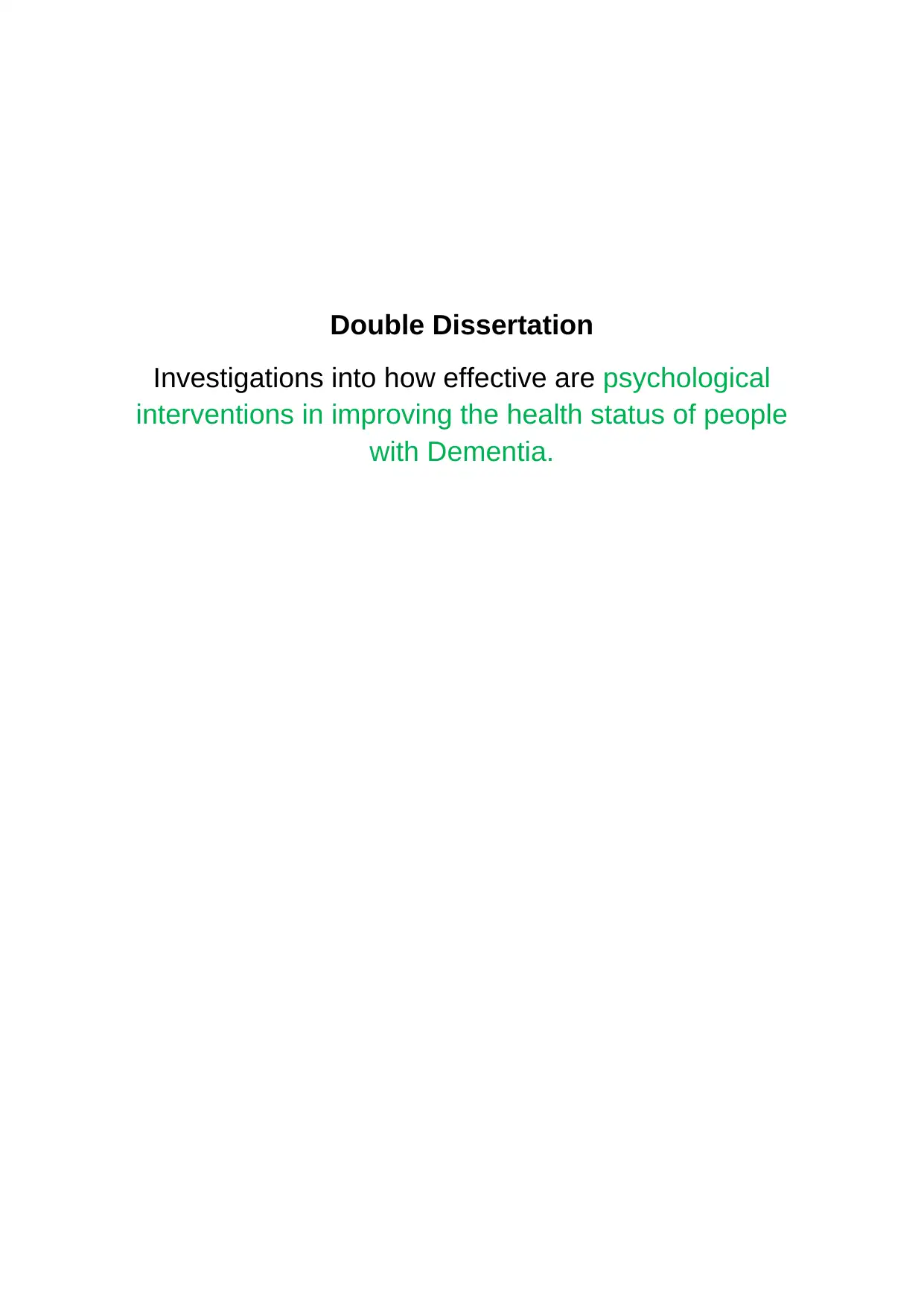
Double Dissertation
Investigations into how effective are psychological
interventions in improving the health status of people
with Dementia.
Investigations into how effective are psychological
interventions in improving the health status of people
with Dementia.
Paraphrase This Document
Need a fresh take? Get an instant paraphrase of this document with our AI Paraphraser
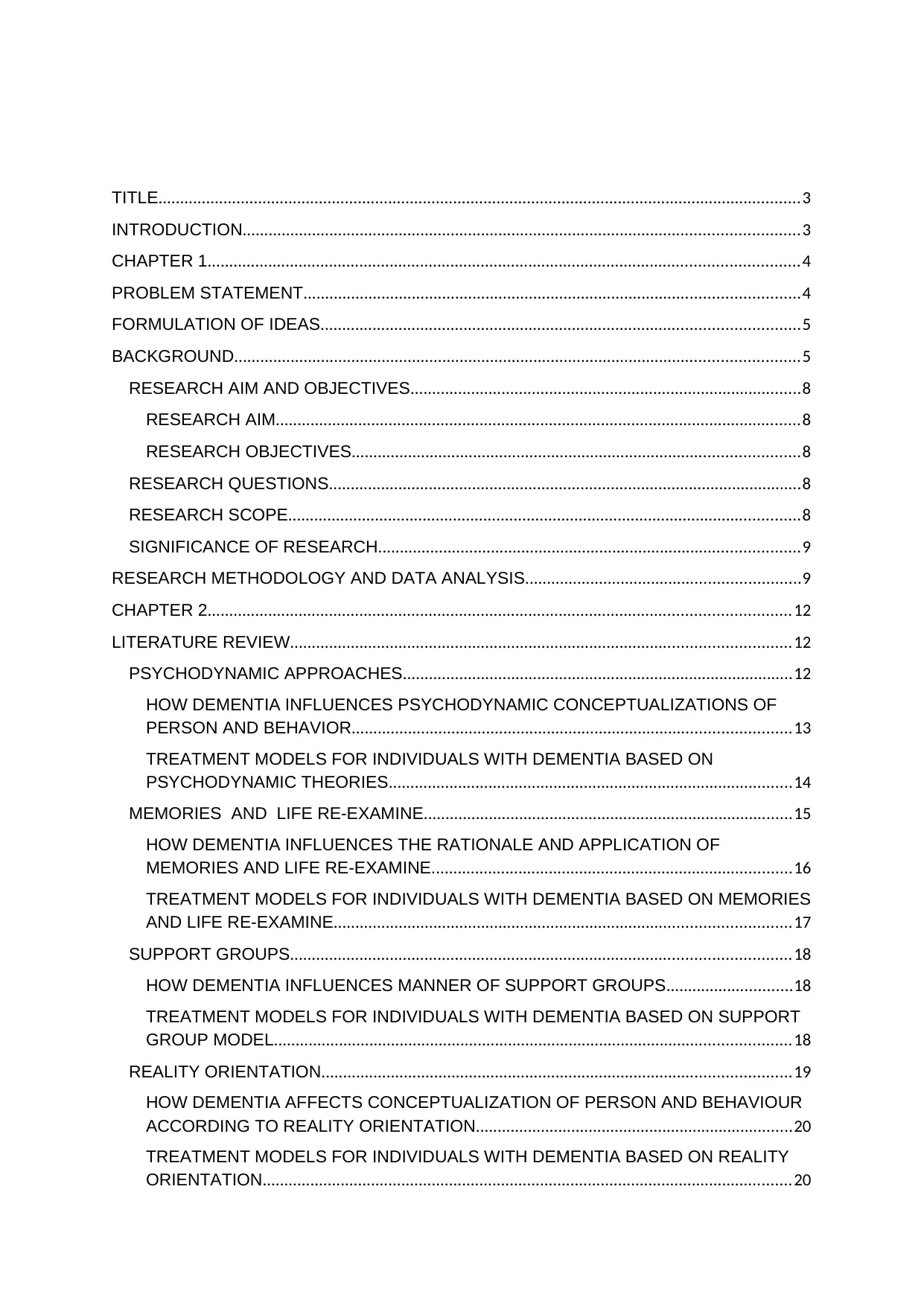
TITLE....................................................................................................................................................3
INTRODUCTION................................................................................................................................3
CHAPTER 1........................................................................................................................................4
PROBLEM STATEMENT..................................................................................................................4
FORMULATION OF IDEAS..............................................................................................................5
BACKGROUND..................................................................................................................................5
RESEARCH AIM AND OBJECTIVES..........................................................................................8
RESEARCH AIM.........................................................................................................................8
RESEARCH OBJECTIVES.......................................................................................................8
RESEARCH QUESTIONS.............................................................................................................8
RESEARCH SCOPE......................................................................................................................8
SIGNIFICANCE OF RESEARCH.................................................................................................9
RESEARCH METHODOLOGY AND DATA ANALYSIS...............................................................9
CHAPTER 2......................................................................................................................................12
LITERATURE REVIEW...................................................................................................................12
PSYCHODYNAMIC APPROACHES..........................................................................................12
HOW DEMENTIA INFLUENCES PSYCHODYNAMIC CONCEPTUALIZATIONS OF
PERSON AND BEHAVIOR.....................................................................................................13
TREATMENT MODELS FOR INDIVIDUALS WITH DEMENTIA BASED ON
PSYCHODYNAMIC THEORIES.............................................................................................14
MEMORIES AND LIFE RE-EXAMINE.....................................................................................15
HOW DEMENTIA INFLUENCES THE RATIONALE AND APPLICATION OF
MEMORIES AND LIFE RE-EXAMINE...................................................................................16
TREATMENT MODELS FOR INDIVIDUALS WITH DEMENTIA BASED ON MEMORIES
AND LIFE RE-EXAMINE.........................................................................................................17
SUPPORT GROUPS...................................................................................................................18
HOW DEMENTIA INFLUENCES MANNER OF SUPPORT GROUPS.............................18
TREATMENT MODELS FOR INDIVIDUALS WITH DEMENTIA BASED ON SUPPORT
GROUP MODEL.......................................................................................................................18
REALITY ORIENTATION............................................................................................................19
HOW DEMENTIA AFFECTS CONCEPTUALIZATION OF PERSON AND BEHAVIOUR
ACCORDING TO REALITY ORIENTATION.........................................................................20
TREATMENT MODELS FOR INDIVIDUALS WITH DEMENTIA BASED ON REALITY
ORIENTATION..........................................................................................................................20
INTRODUCTION................................................................................................................................3
CHAPTER 1........................................................................................................................................4
PROBLEM STATEMENT..................................................................................................................4
FORMULATION OF IDEAS..............................................................................................................5
BACKGROUND..................................................................................................................................5
RESEARCH AIM AND OBJECTIVES..........................................................................................8
RESEARCH AIM.........................................................................................................................8
RESEARCH OBJECTIVES.......................................................................................................8
RESEARCH QUESTIONS.............................................................................................................8
RESEARCH SCOPE......................................................................................................................8
SIGNIFICANCE OF RESEARCH.................................................................................................9
RESEARCH METHODOLOGY AND DATA ANALYSIS...............................................................9
CHAPTER 2......................................................................................................................................12
LITERATURE REVIEW...................................................................................................................12
PSYCHODYNAMIC APPROACHES..........................................................................................12
HOW DEMENTIA INFLUENCES PSYCHODYNAMIC CONCEPTUALIZATIONS OF
PERSON AND BEHAVIOR.....................................................................................................13
TREATMENT MODELS FOR INDIVIDUALS WITH DEMENTIA BASED ON
PSYCHODYNAMIC THEORIES.............................................................................................14
MEMORIES AND LIFE RE-EXAMINE.....................................................................................15
HOW DEMENTIA INFLUENCES THE RATIONALE AND APPLICATION OF
MEMORIES AND LIFE RE-EXAMINE...................................................................................16
TREATMENT MODELS FOR INDIVIDUALS WITH DEMENTIA BASED ON MEMORIES
AND LIFE RE-EXAMINE.........................................................................................................17
SUPPORT GROUPS...................................................................................................................18
HOW DEMENTIA INFLUENCES MANNER OF SUPPORT GROUPS.............................18
TREATMENT MODELS FOR INDIVIDUALS WITH DEMENTIA BASED ON SUPPORT
GROUP MODEL.......................................................................................................................18
REALITY ORIENTATION............................................................................................................19
HOW DEMENTIA AFFECTS CONCEPTUALIZATION OF PERSON AND BEHAVIOUR
ACCORDING TO REALITY ORIENTATION.........................................................................20
TREATMENT MODELS FOR INDIVIDUALS WITH DEMENTIA BASED ON REALITY
ORIENTATION..........................................................................................................................20

MEMORY TRAINING...................................................................................................................22
HOW DEMENTIA AFFECTS STRATEGIES OF MEMORY TRAINING............................23
TREATMENT MODELS FOR PERSONS WITH DEMENTIA BASED ON MEMORY
TEACHING................................................................................................................................24
BEHAVIORAL APPROACHES...................................................................................................25
CHAPTER 3......................................................................................................................................26
CONCLUSION AND RECOMMENDATIONS FOR FUTURE DIRECTIONS.......................26
REFERENCES..................................................................................................................................28
HOW DEMENTIA AFFECTS STRATEGIES OF MEMORY TRAINING............................23
TREATMENT MODELS FOR PERSONS WITH DEMENTIA BASED ON MEMORY
TEACHING................................................................................................................................24
BEHAVIORAL APPROACHES...................................................................................................25
CHAPTER 3......................................................................................................................................26
CONCLUSION AND RECOMMENDATIONS FOR FUTURE DIRECTIONS.......................26
REFERENCES..................................................................................................................................28
⊘ This is a preview!⊘
Do you want full access?
Subscribe today to unlock all pages.

Trusted by 1+ million students worldwide
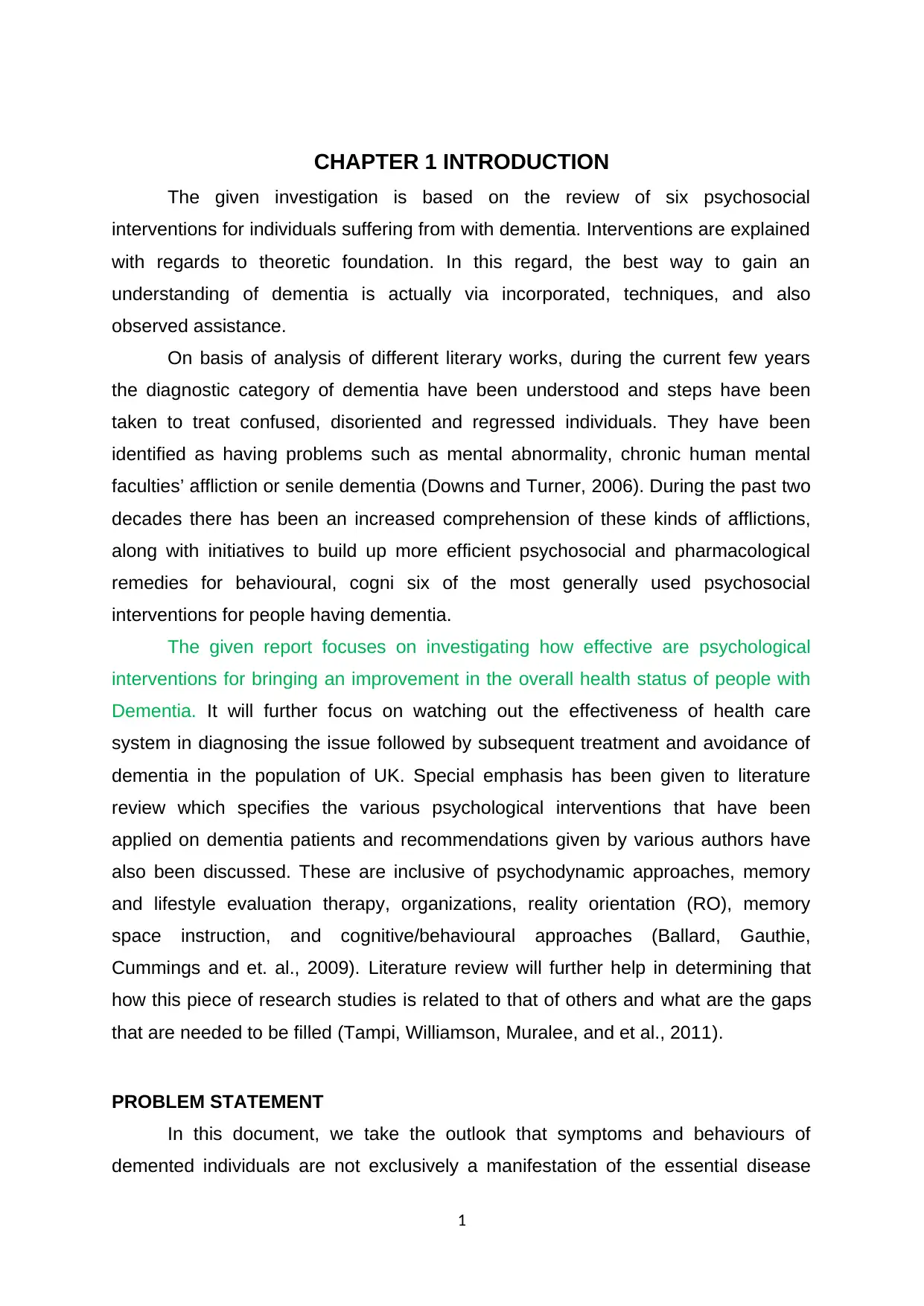
CHAPTER 1 INTRODUCTION
The given investigation is based on the review of six psychosocial
interventions for individuals suffering from with dementia. Interventions are explained
with regards to theoretic foundation. In this regard, the best way to gain an
understanding of dementia is actually via incorporated, techniques, and also
observed assistance.
On basis of analysis of different literary works, during the current few years
the diagnostic category of dementia have been understood and steps have been
taken to treat confused, disoriented and regressed individuals. They have been
identified as having problems such as mental abnormality, chronic human mental
faculties’ affliction or senile dementia (Downs and Turner, 2006). During the past two
decades there has been an increased comprehension of these kinds of afflictions,
along with initiatives to build up more efficient psychosocial and pharmacological
remedies for behavioural, cogni six of the most generally used psychosocial
interventions for people having dementia.
The given report focuses on investigating how effective are psychological
interventions for bringing an improvement in the overall health status of people with
Dementia. It will further focus on watching out the effectiveness of health care
system in diagnosing the issue followed by subsequent treatment and avoidance of
dementia in the population of UK. Special emphasis has been given to literature
review which specifies the various psychological interventions that have been
applied on dementia patients and recommendations given by various authors have
also been discussed. These are inclusive of psychodynamic approaches, memory
and lifestyle evaluation therapy, organizations, reality orientation (RO), memory
space instruction, and cognitive/behavioural approaches (Ballard, Gauthie,
Cummings and et. al., 2009). Literature review will further help in determining that
how this piece of research studies is related to that of others and what are the gaps
that are needed to be filled (Tampi, Williamson, Muralee, and et al., 2011).
PROBLEM STATEMENT
In this document, we take the outlook that symptoms and behaviours of
demented individuals are not exclusively a manifestation of the essential disease
1
The given investigation is based on the review of six psychosocial
interventions for individuals suffering from with dementia. Interventions are explained
with regards to theoretic foundation. In this regard, the best way to gain an
understanding of dementia is actually via incorporated, techniques, and also
observed assistance.
On basis of analysis of different literary works, during the current few years
the diagnostic category of dementia have been understood and steps have been
taken to treat confused, disoriented and regressed individuals. They have been
identified as having problems such as mental abnormality, chronic human mental
faculties’ affliction or senile dementia (Downs and Turner, 2006). During the past two
decades there has been an increased comprehension of these kinds of afflictions,
along with initiatives to build up more efficient psychosocial and pharmacological
remedies for behavioural, cogni six of the most generally used psychosocial
interventions for people having dementia.
The given report focuses on investigating how effective are psychological
interventions for bringing an improvement in the overall health status of people with
Dementia. It will further focus on watching out the effectiveness of health care
system in diagnosing the issue followed by subsequent treatment and avoidance of
dementia in the population of UK. Special emphasis has been given to literature
review which specifies the various psychological interventions that have been
applied on dementia patients and recommendations given by various authors have
also been discussed. These are inclusive of psychodynamic approaches, memory
and lifestyle evaluation therapy, organizations, reality orientation (RO), memory
space instruction, and cognitive/behavioural approaches (Ballard, Gauthie,
Cummings and et. al., 2009). Literature review will further help in determining that
how this piece of research studies is related to that of others and what are the gaps
that are needed to be filled (Tampi, Williamson, Muralee, and et al., 2011).
PROBLEM STATEMENT
In this document, we take the outlook that symptoms and behaviours of
demented individuals are not exclusively a manifestation of the essential disease
1
Paraphrase This Document
Need a fresh take? Get an instant paraphrase of this document with our AI Paraphraser
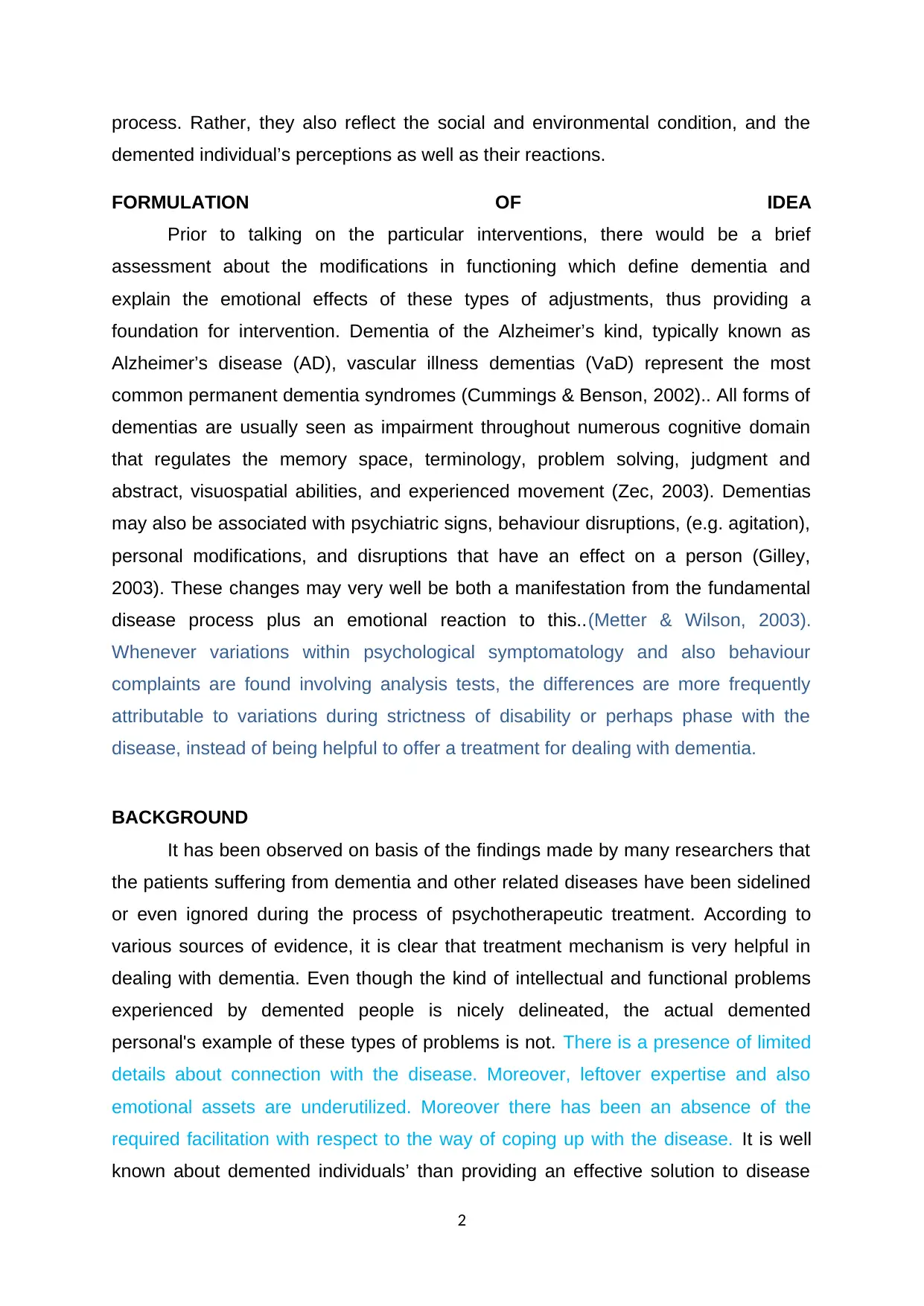
process. Rather, they also reflect the social and environmental condition, and the
demented individual’s perceptions as well as their reactions.
FORMULATION OF IDEA
Prior to talking on the particular interventions, there would be a brief
assessment about the modifications in functioning which define dementia and
explain the emotional effects of these types of adjustments, thus providing a
foundation for intervention. Dementia of the Alzheimer’s kind, typically known as
Alzheimer’s disease (AD), vascular illness dementias (VaD) represent the most
common permanent dementia syndromes (Cummings & Benson, 2002).. All forms of
dementias are usually seen as impairment throughout numerous cognitive domain
that regulates the memory space, terminology, problem solving, judgment and
abstract, visuospatial abilities, and experienced movement (Zec, 2003). Dementias
may also be associated with psychiatric signs, behaviour disruptions, (e.g. agitation),
personal modifications, and disruptions that have an effect on a person (Gilley,
2003). These changes may very well be both a manifestation from the fundamental
disease process plus an emotional reaction to this..(Metter & Wilson, 2003).
Whenever variations within psychological symptomatology and also behaviour
complaints are found involving analysis tests, the differences are more frequently
attributable to variations during strictness of disability or perhaps phase with the
disease, instead of being helpful to offer a treatment for dealing with dementia.
BACKGROUND
It has been observed on basis of the findings made by many researchers that
the patients suffering from dementia and other related diseases have been sidelined
or even ignored during the process of psychotherapeutic treatment. According to
various sources of evidence, it is clear that treatment mechanism is very helpful in
dealing with dementia. Even though the kind of intellectual and functional problems
experienced by demented people is nicely delineated, the actual demented
personal's example of these types of problems is not. There is a presence of limited
details about connection with the disease. Moreover, leftover expertise and also
emotional assets are underutilized. Moreover there has been an absence of the
required facilitation with respect to the way of coping up with the disease. It is well
known about demented individuals’ than providing an effective solution to disease
2
demented individual’s perceptions as well as their reactions.
FORMULATION OF IDEA
Prior to talking on the particular interventions, there would be a brief
assessment about the modifications in functioning which define dementia and
explain the emotional effects of these types of adjustments, thus providing a
foundation for intervention. Dementia of the Alzheimer’s kind, typically known as
Alzheimer’s disease (AD), vascular illness dementias (VaD) represent the most
common permanent dementia syndromes (Cummings & Benson, 2002).. All forms of
dementias are usually seen as impairment throughout numerous cognitive domain
that regulates the memory space, terminology, problem solving, judgment and
abstract, visuospatial abilities, and experienced movement (Zec, 2003). Dementias
may also be associated with psychiatric signs, behaviour disruptions, (e.g. agitation),
personal modifications, and disruptions that have an effect on a person (Gilley,
2003). These changes may very well be both a manifestation from the fundamental
disease process plus an emotional reaction to this..(Metter & Wilson, 2003).
Whenever variations within psychological symptomatology and also behaviour
complaints are found involving analysis tests, the differences are more frequently
attributable to variations during strictness of disability or perhaps phase with the
disease, instead of being helpful to offer a treatment for dealing with dementia.
BACKGROUND
It has been observed on basis of the findings made by many researchers that
the patients suffering from dementia and other related diseases have been sidelined
or even ignored during the process of psychotherapeutic treatment. According to
various sources of evidence, it is clear that treatment mechanism is very helpful in
dealing with dementia. Even though the kind of intellectual and functional problems
experienced by demented people is nicely delineated, the actual demented
personal's example of these types of problems is not. There is a presence of limited
details about connection with the disease. Moreover, leftover expertise and also
emotional assets are underutilized. Moreover there has been an absence of the
required facilitation with respect to the way of coping up with the disease. It is well
known about demented individuals’ than providing an effective solution to disease
2
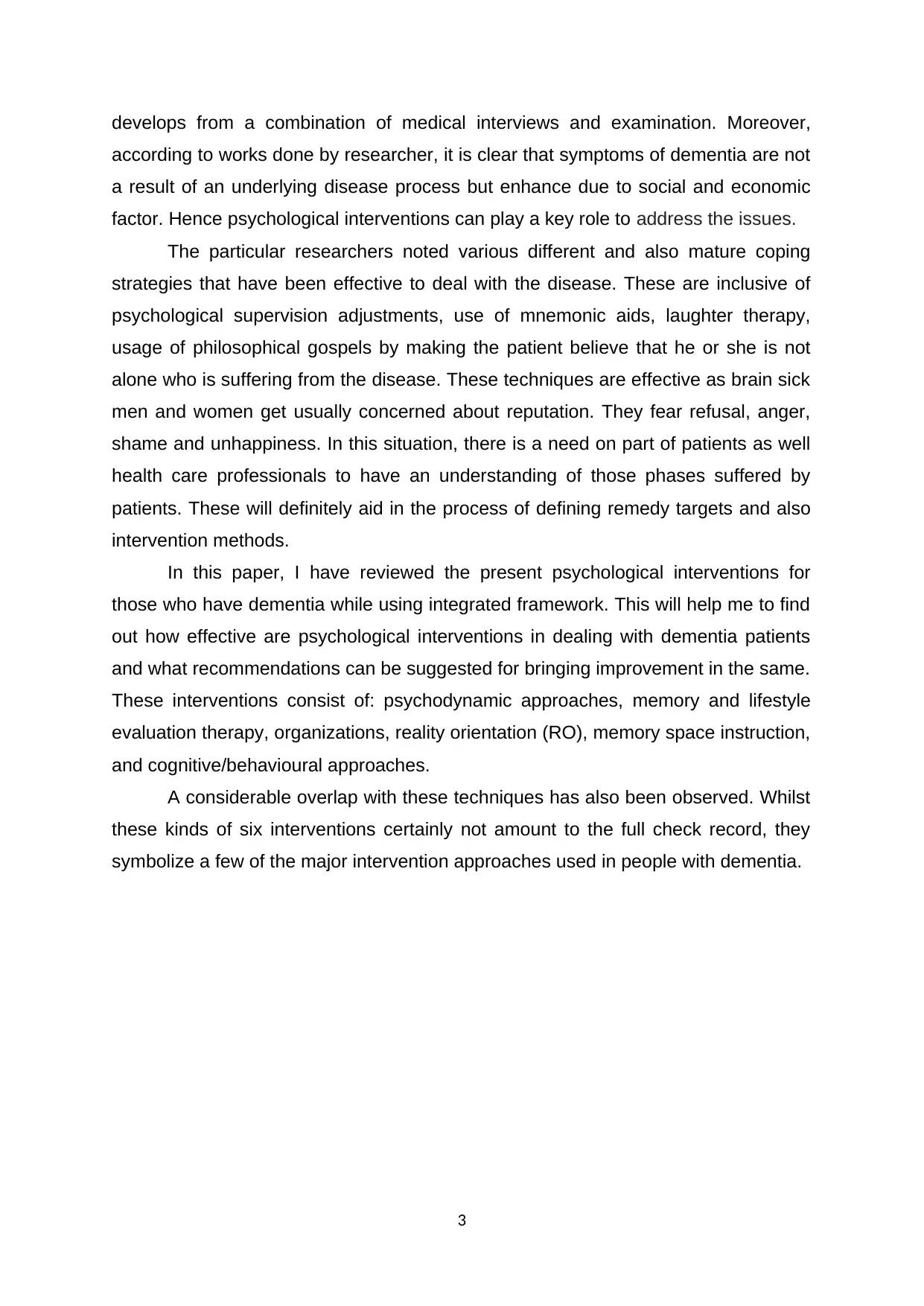
develops from a combination of medical interviews and examination. Moreover,
according to works done by researcher, it is clear that symptoms of dementia are not
a result of an underlying disease process but enhance due to social and economic
factor. Hence psychological interventions can play a key role to address the issues.
The particular researchers noted various different and also mature coping
strategies that have been effective to deal with the disease. These are inclusive of
psychological supervision adjustments, use of mnemonic aids, laughter therapy,
usage of philosophical gospels by making the patient believe that he or she is not
alone who is suffering from the disease. These techniques are effective as brain sick
men and women get usually concerned about reputation. They fear refusal, anger,
shame and unhappiness. In this situation, there is a need on part of patients as well
health care professionals to have an understanding of those phases suffered by
patients. These will definitely aid in the process of defining remedy targets and also
intervention methods.
In this paper, I have reviewed the present psychological interventions for
those who have dementia while using integrated framework. This will help me to find
out how effective are psychological interventions in dealing with dementia patients
and what recommendations can be suggested for bringing improvement in the same.
These interventions consist of: psychodynamic approaches, memory and lifestyle
evaluation therapy, organizations, reality orientation (RO), memory space instruction,
and cognitive/behavioural approaches.
A considerable overlap with these techniques has also been observed. Whilst
these kinds of six interventions certainly not amount to the full check record, they
symbolize a few of the major intervention approaches used in people with dementia.
3
according to works done by researcher, it is clear that symptoms of dementia are not
a result of an underlying disease process but enhance due to social and economic
factor. Hence psychological interventions can play a key role to address the issues.
The particular researchers noted various different and also mature coping
strategies that have been effective to deal with the disease. These are inclusive of
psychological supervision adjustments, use of mnemonic aids, laughter therapy,
usage of philosophical gospels by making the patient believe that he or she is not
alone who is suffering from the disease. These techniques are effective as brain sick
men and women get usually concerned about reputation. They fear refusal, anger,
shame and unhappiness. In this situation, there is a need on part of patients as well
health care professionals to have an understanding of those phases suffered by
patients. These will definitely aid in the process of defining remedy targets and also
intervention methods.
In this paper, I have reviewed the present psychological interventions for
those who have dementia while using integrated framework. This will help me to find
out how effective are psychological interventions in dealing with dementia patients
and what recommendations can be suggested for bringing improvement in the same.
These interventions consist of: psychodynamic approaches, memory and lifestyle
evaluation therapy, organizations, reality orientation (RO), memory space instruction,
and cognitive/behavioural approaches.
A considerable overlap with these techniques has also been observed. Whilst
these kinds of six interventions certainly not amount to the full check record, they
symbolize a few of the major intervention approaches used in people with dementia.
3
⊘ This is a preview!⊘
Do you want full access?
Subscribe today to unlock all pages.

Trusted by 1+ million students worldwide
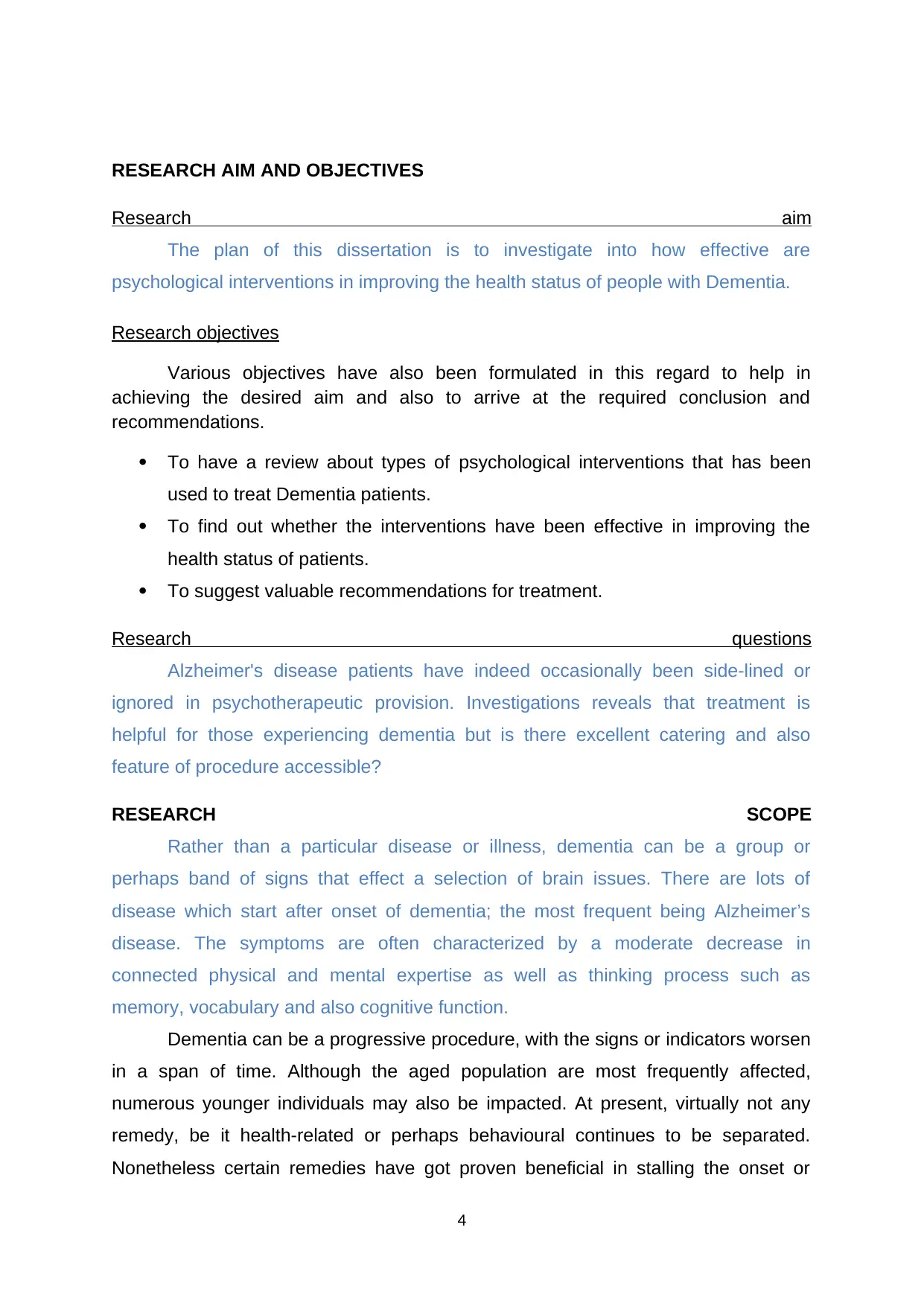
RESEARCH AIM AND OBJECTIVES
Research aim
The plan of this dissertation is to investigate into how effective are
psychological interventions in improving the health status of people with Dementia.
Research objectives
Various objectives have also been formulated in this regard to help in
achieving the desired aim and also to arrive at the required conclusion and
recommendations.
To have a review about types of psychological interventions that has been
used to treat Dementia patients.
To find out whether the interventions have been effective in improving the
health status of patients.
To suggest valuable recommendations for treatment.
Research questions
Alzheimer's disease patients have indeed occasionally been side-lined or
ignored in psychotherapeutic provision. Investigations reveals that treatment is
helpful for those experiencing dementia but is there excellent catering and also
feature of procedure accessible?
RESEARCH SCOPE
Rather than a particular disease or illness, dementia can be a group or
perhaps band of signs that effect a selection of brain issues. There are lots of
disease which start after onset of dementia; the most frequent being Alzheimer’s
disease. The symptoms are often characterized by a moderate decrease in
connected physical and mental expertise as well as thinking process such as
memory, vocabulary and also cognitive function.
Dementia can be a progressive procedure, with the signs or indicators worsen
in a span of time. Although the aged population are most frequently affected,
numerous younger individuals may also be impacted. At present, virtually not any
remedy, be it health-related or perhaps behavioural continues to be separated.
Nonetheless certain remedies have got proven beneficial in stalling the onset or
4
Research aim
The plan of this dissertation is to investigate into how effective are
psychological interventions in improving the health status of people with Dementia.
Research objectives
Various objectives have also been formulated in this regard to help in
achieving the desired aim and also to arrive at the required conclusion and
recommendations.
To have a review about types of psychological interventions that has been
used to treat Dementia patients.
To find out whether the interventions have been effective in improving the
health status of patients.
To suggest valuable recommendations for treatment.
Research questions
Alzheimer's disease patients have indeed occasionally been side-lined or
ignored in psychotherapeutic provision. Investigations reveals that treatment is
helpful for those experiencing dementia but is there excellent catering and also
feature of procedure accessible?
RESEARCH SCOPE
Rather than a particular disease or illness, dementia can be a group or
perhaps band of signs that effect a selection of brain issues. There are lots of
disease which start after onset of dementia; the most frequent being Alzheimer’s
disease. The symptoms are often characterized by a moderate decrease in
connected physical and mental expertise as well as thinking process such as
memory, vocabulary and also cognitive function.
Dementia can be a progressive procedure, with the signs or indicators worsen
in a span of time. Although the aged population are most frequently affected,
numerous younger individuals may also be impacted. At present, virtually not any
remedy, be it health-related or perhaps behavioural continues to be separated.
Nonetheless certain remedies have got proven beneficial in stalling the onset or
4
Paraphrase This Document
Need a fresh take? Get an instant paraphrase of this document with our AI Paraphraser
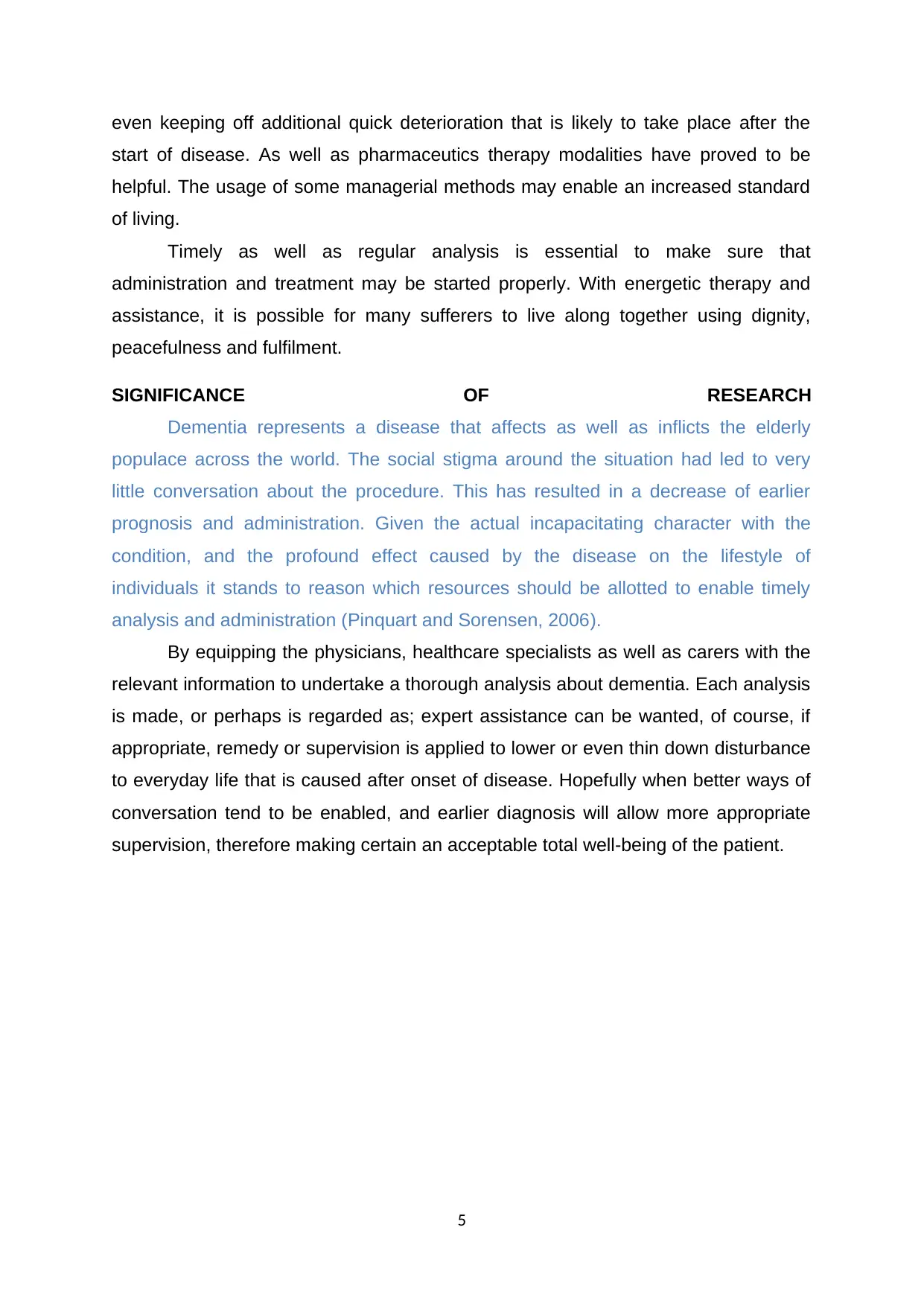
even keeping off additional quick deterioration that is likely to take place after the
start of disease. As well as pharmaceutics therapy modalities have proved to be
helpful. The usage of some managerial methods may enable an increased standard
of living.
Timely as well as regular analysis is essential to make sure that
administration and treatment may be started properly. With energetic therapy and
assistance, it is possible for many sufferers to live along together using dignity,
peacefulness and fulfilment.
SIGNIFICANCE OF RESEARCH
Dementia represents a disease that affects as well as inflicts the elderly
populace across the world. The social stigma around the situation had led to very
little conversation about the procedure. This has resulted in a decrease of earlier
prognosis and administration. Given the actual incapacitating character with the
condition, and the profound effect caused by the disease on the lifestyle of
individuals it stands to reason which resources should be allotted to enable timely
analysis and administration (Pinquart and Sorensen, 2006).
By equipping the physicians, healthcare specialists as well as carers with the
relevant information to undertake a thorough analysis about dementia. Each analysis
is made, or perhaps is regarded as; expert assistance can be wanted, of course, if
appropriate, remedy or supervision is applied to lower or even thin down disturbance
to everyday life that is caused after onset of disease. Hopefully when better ways of
conversation tend to be enabled, and earlier diagnosis will allow more appropriate
supervision, therefore making certain an acceptable total well-being of the patient.
5
start of disease. As well as pharmaceutics therapy modalities have proved to be
helpful. The usage of some managerial methods may enable an increased standard
of living.
Timely as well as regular analysis is essential to make sure that
administration and treatment may be started properly. With energetic therapy and
assistance, it is possible for many sufferers to live along together using dignity,
peacefulness and fulfilment.
SIGNIFICANCE OF RESEARCH
Dementia represents a disease that affects as well as inflicts the elderly
populace across the world. The social stigma around the situation had led to very
little conversation about the procedure. This has resulted in a decrease of earlier
prognosis and administration. Given the actual incapacitating character with the
condition, and the profound effect caused by the disease on the lifestyle of
individuals it stands to reason which resources should be allotted to enable timely
analysis and administration (Pinquart and Sorensen, 2006).
By equipping the physicians, healthcare specialists as well as carers with the
relevant information to undertake a thorough analysis about dementia. Each analysis
is made, or perhaps is regarded as; expert assistance can be wanted, of course, if
appropriate, remedy or supervision is applied to lower or even thin down disturbance
to everyday life that is caused after onset of disease. Hopefully when better ways of
conversation tend to be enabled, and earlier diagnosis will allow more appropriate
supervision, therefore making certain an acceptable total well-being of the patient.
5
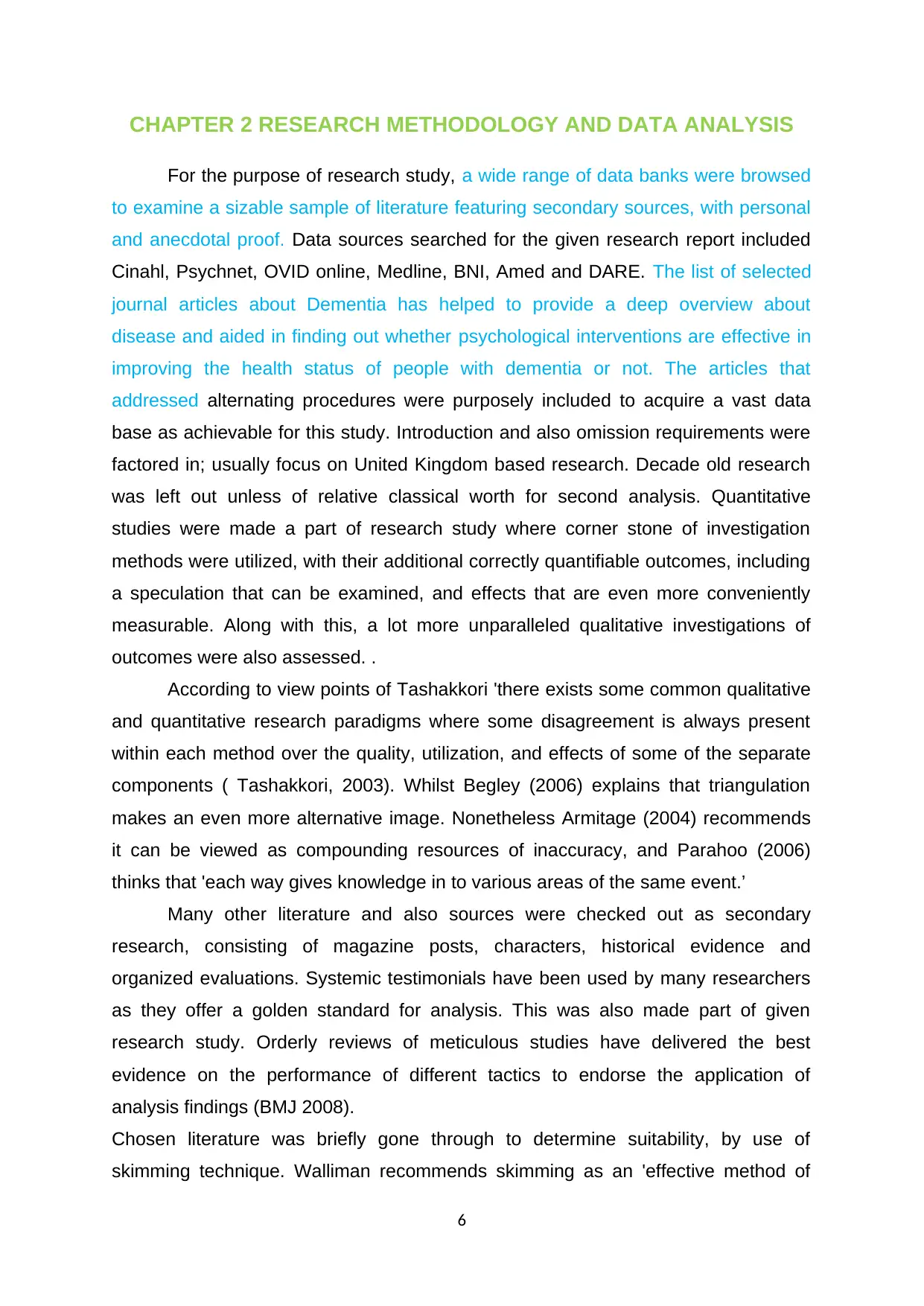
CHAPTER 2 RESEARCH METHODOLOGY AND DATA ANALYSIS
For the purpose of research study, a wide range of data banks were browsed
to examine a sizable sample of literature featuring secondary sources, with personal
and anecdotal proof. Data sources searched for the given research report included
Cinahl, Psychnet, OVID online, Medline, BNI, Amed and DARE. The list of selected
journal articles about Dementia has helped to provide a deep overview about
disease and aided in finding out whether psychological interventions are effective in
improving the health status of people with dementia or not. The articles that
addressed alternating procedures were purposely included to acquire a vast data
base as achievable for this study. Introduction and also omission requirements were
factored in; usually focus on United Kingdom based research. Decade old research
was left out unless of relative classical worth for second analysis. Quantitative
studies were made a part of research study where corner stone of investigation
methods were utilized, with their additional correctly quantifiable outcomes, including
a speculation that can be examined, and effects that are even more conveniently
measurable. Along with this, a lot more unparalleled qualitative investigations of
outcomes were also assessed. .
According to view points of Tashakkori 'there exists some common qualitative
and quantitative research paradigms where some disagreement is always present
within each method over the quality, utilization, and effects of some of the separate
components ( Tashakkori, 2003). Whilst Begley (2006) explains that triangulation
makes an even more alternative image. Nonetheless Armitage (2004) recommends
it can be viewed as compounding resources of inaccuracy, and Parahoo (2006)
thinks that 'each way gives knowledge in to various areas of the same event.’
Many other literature and also sources were checked out as secondary
research, consisting of magazine posts, characters, historical evidence and
organized evaluations. Systemic testimonials have been used by many researchers
as they offer a golden standard for analysis. This was also made part of given
research study. Orderly reviews of meticulous studies have delivered the best
evidence on the performance of different tactics to endorse the application of
analysis findings (BMJ 2008).
Chosen literature was briefly gone through to determine suitability, by use of
skimming technique. Walliman recommends skimming as an 'effective method of
6
For the purpose of research study, a wide range of data banks were browsed
to examine a sizable sample of literature featuring secondary sources, with personal
and anecdotal proof. Data sources searched for the given research report included
Cinahl, Psychnet, OVID online, Medline, BNI, Amed and DARE. The list of selected
journal articles about Dementia has helped to provide a deep overview about
disease and aided in finding out whether psychological interventions are effective in
improving the health status of people with dementia or not. The articles that
addressed alternating procedures were purposely included to acquire a vast data
base as achievable for this study. Introduction and also omission requirements were
factored in; usually focus on United Kingdom based research. Decade old research
was left out unless of relative classical worth for second analysis. Quantitative
studies were made a part of research study where corner stone of investigation
methods were utilized, with their additional correctly quantifiable outcomes, including
a speculation that can be examined, and effects that are even more conveniently
measurable. Along with this, a lot more unparalleled qualitative investigations of
outcomes were also assessed. .
According to view points of Tashakkori 'there exists some common qualitative
and quantitative research paradigms where some disagreement is always present
within each method over the quality, utilization, and effects of some of the separate
components ( Tashakkori, 2003). Whilst Begley (2006) explains that triangulation
makes an even more alternative image. Nonetheless Armitage (2004) recommends
it can be viewed as compounding resources of inaccuracy, and Parahoo (2006)
thinks that 'each way gives knowledge in to various areas of the same event.’
Many other literature and also sources were checked out as secondary
research, consisting of magazine posts, characters, historical evidence and
organized evaluations. Systemic testimonials have been used by many researchers
as they offer a golden standard for analysis. This was also made part of given
research study. Orderly reviews of meticulous studies have delivered the best
evidence on the performance of different tactics to endorse the application of
analysis findings (BMJ 2008).
Chosen literature was briefly gone through to determine suitability, by use of
skimming technique. Walliman recommends skimming as an 'effective method of
6
⊘ This is a preview!⊘
Do you want full access?
Subscribe today to unlock all pages.

Trusted by 1+ million students worldwide
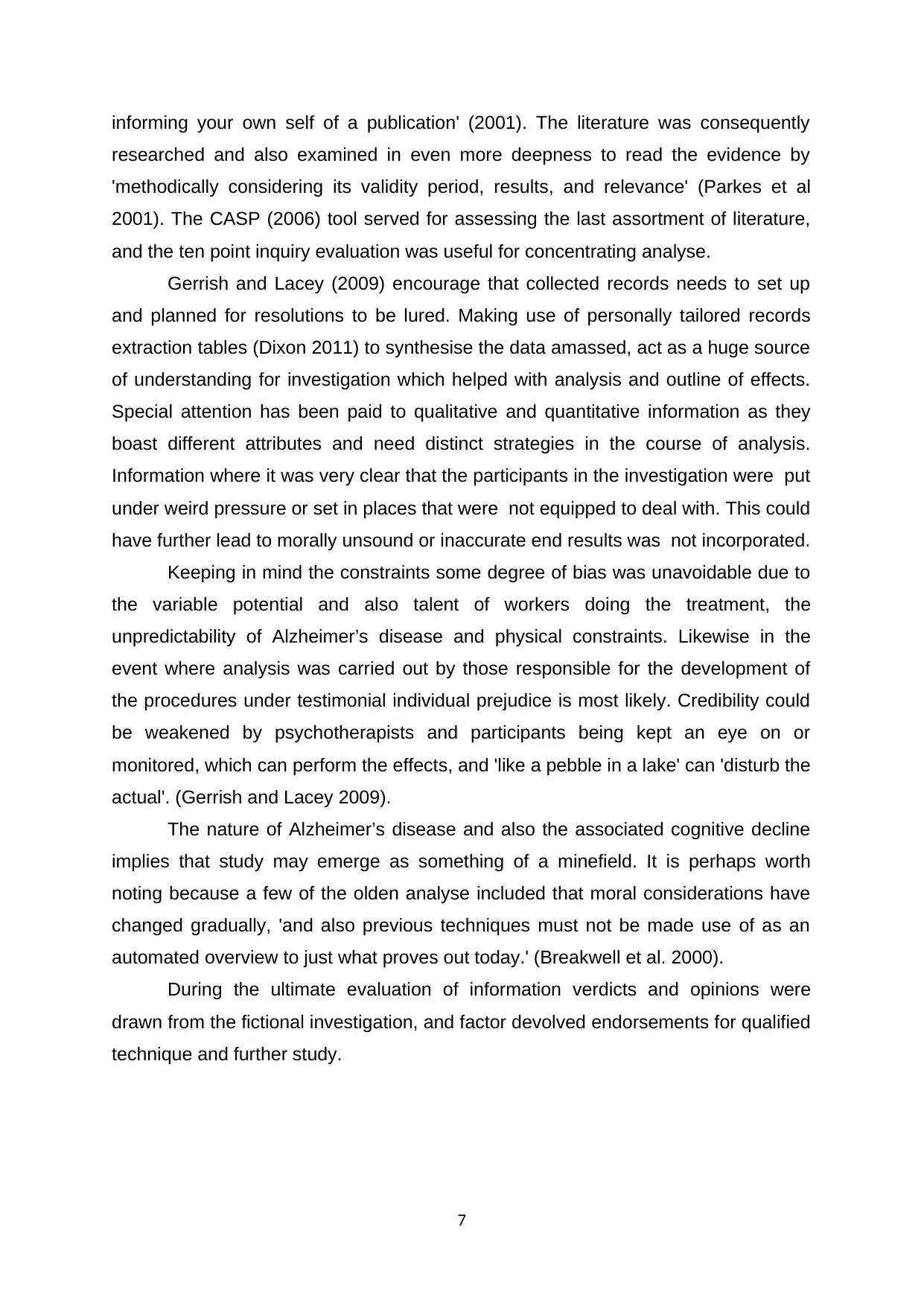
informing your own self of a publication' (2001). The literature was consequently
researched and also examined in even more deepness to read the evidence by
'methodically considering its validity period, results, and relevance' (Parkes et al
2001). The CASP (2006) tool served for assessing the last assortment of literature,
and the ten point inquiry evaluation was useful for concentrating analyse.
Gerrish and Lacey (2009) encourage that collected records needs to set up
and planned for resolutions to be lured. Making use of personally tailored records
extraction tables (Dixon 2011) to synthesise the data amassed, act as a huge source
of understanding for investigation which helped with analysis and outline of effects.
Special attention has been paid to qualitative and quantitative information as they
boast different attributes and need distinct strategies in the course of analysis.
Information where it was very clear that the participants in the investigation were put
under weird pressure or set in places that were not equipped to deal with. This could
have further lead to morally unsound or inaccurate end results was not incorporated.
Keeping in mind the constraints some degree of bias was unavoidable due to
the variable potential and also talent of workers doing the treatment, the
unpredictability of Alzheimer’s disease and physical constraints. Likewise in the
event where analysis was carried out by those responsible for the development of
the procedures under testimonial individual prejudice is most likely. Credibility could
be weakened by psychotherapists and participants being kept an eye on or
monitored, which can perform the effects, and 'like a pebble in a lake' can 'disturb the
actual'. (Gerrish and Lacey 2009).
The nature of Alzheimer’s disease and also the associated cognitive decline
implies that study may emerge as something of a minefield. It is perhaps worth
noting because a few of the olden analyse included that moral considerations have
changed gradually, 'and also previous techniques must not be made use of as an
automated overview to just what proves out today.' (Breakwell et al. 2000).
During the ultimate evaluation of information verdicts and opinions were
drawn from the fictional investigation, and factor devolved endorsements for qualified
technique and further study.
7
researched and also examined in even more deepness to read the evidence by
'methodically considering its validity period, results, and relevance' (Parkes et al
2001). The CASP (2006) tool served for assessing the last assortment of literature,
and the ten point inquiry evaluation was useful for concentrating analyse.
Gerrish and Lacey (2009) encourage that collected records needs to set up
and planned for resolutions to be lured. Making use of personally tailored records
extraction tables (Dixon 2011) to synthesise the data amassed, act as a huge source
of understanding for investigation which helped with analysis and outline of effects.
Special attention has been paid to qualitative and quantitative information as they
boast different attributes and need distinct strategies in the course of analysis.
Information where it was very clear that the participants in the investigation were put
under weird pressure or set in places that were not equipped to deal with. This could
have further lead to morally unsound or inaccurate end results was not incorporated.
Keeping in mind the constraints some degree of bias was unavoidable due to
the variable potential and also talent of workers doing the treatment, the
unpredictability of Alzheimer’s disease and physical constraints. Likewise in the
event where analysis was carried out by those responsible for the development of
the procedures under testimonial individual prejudice is most likely. Credibility could
be weakened by psychotherapists and participants being kept an eye on or
monitored, which can perform the effects, and 'like a pebble in a lake' can 'disturb the
actual'. (Gerrish and Lacey 2009).
The nature of Alzheimer’s disease and also the associated cognitive decline
implies that study may emerge as something of a minefield. It is perhaps worth
noting because a few of the olden analyse included that moral considerations have
changed gradually, 'and also previous techniques must not be made use of as an
automated overview to just what proves out today.' (Breakwell et al. 2000).
During the ultimate evaluation of information verdicts and opinions were
drawn from the fictional investigation, and factor devolved endorsements for qualified
technique and further study.
7
Paraphrase This Document
Need a fresh take? Get an instant paraphrase of this document with our AI Paraphraser
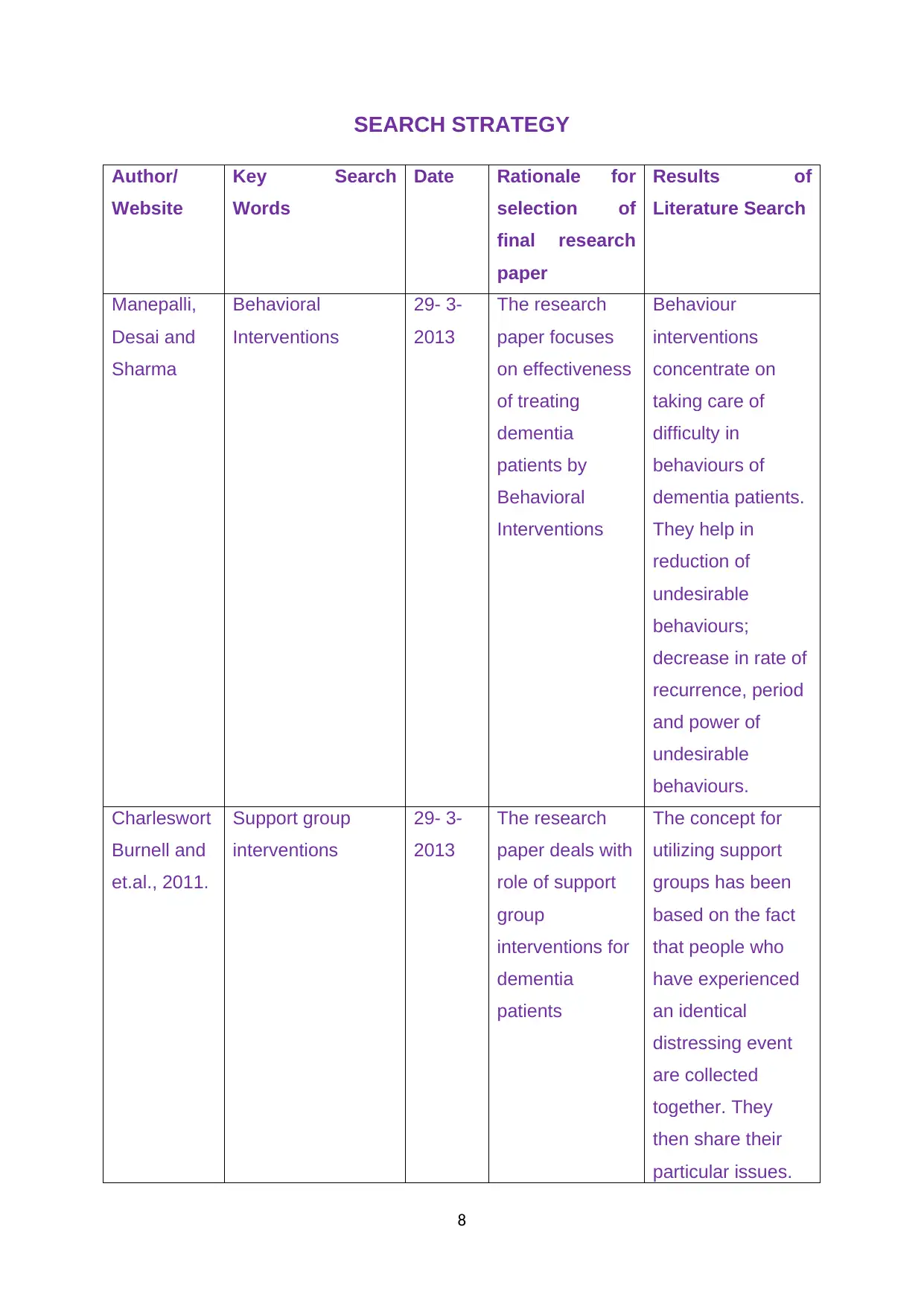
SEARCH STRATEGY
Author/
Website
Key Search
Words
Date Rationale for
selection of
final research
paper
Results of
Literature Search
Manepalli,
Desai and
Sharma
Behavioral
Interventions
29- 3-
2013
The research
paper focuses
on effectiveness
of treating
dementia
patients by
Behavioral
Interventions
Behaviour
interventions
concentrate on
taking care of
difficulty in
behaviours of
dementia patients.
They help in
reduction of
undesirable
behaviours;
decrease in rate of
recurrence, period
and power of
undesirable
behaviours.
Charleswort
Burnell and
et.al., 2011.
Support group
interventions
29- 3-
2013
The research
paper deals with
role of support
group
interventions for
dementia
patients
The concept for
utilizing support
groups has been
based on the fact
that people who
have experienced
an identical
distressing event
are collected
together. They
then share their
particular issues.
8
Author/
Website
Key Search
Words
Date Rationale for
selection of
final research
paper
Results of
Literature Search
Manepalli,
Desai and
Sharma
Behavioral
Interventions
29- 3-
2013
The research
paper focuses
on effectiveness
of treating
dementia
patients by
Behavioral
Interventions
Behaviour
interventions
concentrate on
taking care of
difficulty in
behaviours of
dementia patients.
They help in
reduction of
undesirable
behaviours;
decrease in rate of
recurrence, period
and power of
undesirable
behaviours.
Charleswort
Burnell and
et.al., 2011.
Support group
interventions
29- 3-
2013
The research
paper deals with
role of support
group
interventions for
dementia
patients
The concept for
utilizing support
groups has been
based on the fact
that people who
have experienced
an identical
distressing event
are collected
together. They
then share their
particular issues.
8
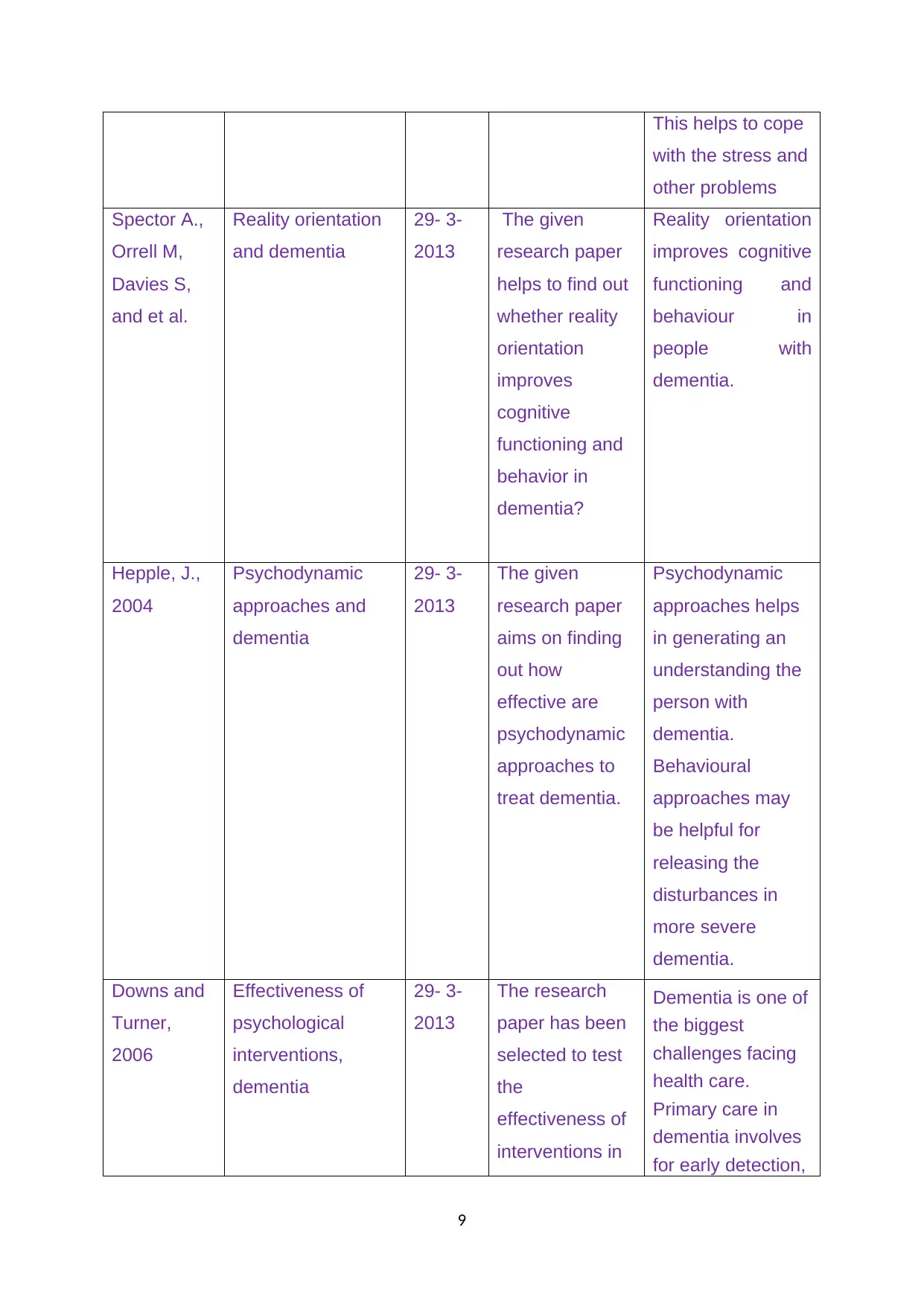
This helps to cope
with the stress and
other problems
Spector A.,
Orrell M,
Davies S,
and et al.
Reality orientation
and dementia
29- 3-
2013
The given
research paper
helps to find out
whether reality
orientation
improves
cognitive
functioning and
behavior in
dementia?
Reality orientation
improves cognitive
functioning and
behaviour in
people with
dementia.
Hepple, J.,
2004
Psychodynamic
approaches and
dementia
29- 3-
2013
The given
research paper
aims on finding
out how
effective are
psychodynamic
approaches to
treat dementia.
Psychodynamic
approaches helps
in generating an
understanding the
person with
dementia.
Behavioural
approaches may
be helpful for
releasing the
disturbances in
more severe
dementia.
Downs and
Turner,
2006
Effectiveness of
psychological
interventions,
dementia
29- 3-
2013
The research
paper has been
selected to test
the
effectiveness of
interventions in
Dementia is one of
the biggest
challenges facing
health care.
Primary care in
dementia involves
for early detection,
9
with the stress and
other problems
Spector A.,
Orrell M,
Davies S,
and et al.
Reality orientation
and dementia
29- 3-
2013
The given
research paper
helps to find out
whether reality
orientation
improves
cognitive
functioning and
behavior in
dementia?
Reality orientation
improves cognitive
functioning and
behaviour in
people with
dementia.
Hepple, J.,
2004
Psychodynamic
approaches and
dementia
29- 3-
2013
The given
research paper
aims on finding
out how
effective are
psychodynamic
approaches to
treat dementia.
Psychodynamic
approaches helps
in generating an
understanding the
person with
dementia.
Behavioural
approaches may
be helpful for
releasing the
disturbances in
more severe
dementia.
Downs and
Turner,
2006
Effectiveness of
psychological
interventions,
dementia
29- 3-
2013
The research
paper has been
selected to test
the
effectiveness of
interventions in
Dementia is one of
the biggest
challenges facing
health care.
Primary care in
dementia involves
for early detection,
9
⊘ This is a preview!⊘
Do you want full access?
Subscribe today to unlock all pages.

Trusted by 1+ million students worldwide
1 out of 36
Related Documents
Your All-in-One AI-Powered Toolkit for Academic Success.
+13062052269
info@desklib.com
Available 24*7 on WhatsApp / Email
![[object Object]](/_next/static/media/star-bottom.7253800d.svg)
Unlock your academic potential
Copyright © 2020–2026 A2Z Services. All Rights Reserved. Developed and managed by ZUCOL.





